Past Fellows and Visiting Faculty
Fall 2002 Fellows
Roza Eftekhari was the senior editor of Zanan magazine, Iran’s first feminist journal. She is a writer, translator and editor. After graduating from Allameh Tabatabai University, Tehran, she started working on women’s issues in Iran and joined Zanan Magazine. As the senior editor, she has been responsible for the planning and selection of topics, articles and interviews. In the past few years, she has also been the person in charge of developing the ideas section of Zanan, which has been a lively forum for heated discussion about the role of women and the dynamics of patriarchy in Iran and the Islamic world in general. In 1999, she became a member of the team that created the project “Religious Intellectuals and Women’s Issues in Iran.” This major project, involving the publication of interviews with prominent religious intellectuals and clerics, offered the first and most comprehensive forum for religious intellectuals and women to engage in conversation on women’s issues and the ways these issues intersect with the objectives of the reform movement in Iran. Her research at the Shorenstein Center will examine the impact Zanan magazine has had on public policy in its ten years of existence.
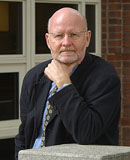 Jack Hamilton is dean of the Manship School of Mass Communication at Louisiana State University and is the Hopkins P. Breazeale LSU Foundation Professor. He is also a commentator on MarketPlace, a weekly public radio program broadcast nationally. He joined LSU after more than 20 years as a journalist. Hamilton has reported for the Milwaukee Journal, the Christian Science Monitor and ABC Radio, among others. He is author of Main Street America and the Third World; Entangling Alliances: How The Third World Shapes Our Lives; Edgar Snow: A Biography; Hold the Press: The Inside Story on Newspapers (with co-author George Krimsky); and Casanova Was a Book Lover: And Other Naked Truths and Provocative Curiosities About the Writing, Selling, and Reading of Books. In addition to serving as a foreign correspondent, he directed a Society of Professional Journalists’ project to improve news coverage of the Third World. In the course of his career, Hamilton has had assignments in more than 50 countries in Africa, Asia, Europe and Latin America. In recent years he has undertaken journalism training and reporting missions to Belarus, Bosnia, Brazil, Chile, Georgia, India, Jamaica and Russia. Hamilton earned his bachelor’s and master’s degrees in journalism from Marquette and Boston University respectively, and a doctorate in American Civilization from George Washington University. Professor Hamilton will develop a new model for assessing the way Americans get foreign news and teach a study group about foreign correspondents. Paper PDF
Jack Hamilton is dean of the Manship School of Mass Communication at Louisiana State University and is the Hopkins P. Breazeale LSU Foundation Professor. He is also a commentator on MarketPlace, a weekly public radio program broadcast nationally. He joined LSU after more than 20 years as a journalist. Hamilton has reported for the Milwaukee Journal, the Christian Science Monitor and ABC Radio, among others. He is author of Main Street America and the Third World; Entangling Alliances: How The Third World Shapes Our Lives; Edgar Snow: A Biography; Hold the Press: The Inside Story on Newspapers (with co-author George Krimsky); and Casanova Was a Book Lover: And Other Naked Truths and Provocative Curiosities About the Writing, Selling, and Reading of Books. In addition to serving as a foreign correspondent, he directed a Society of Professional Journalists’ project to improve news coverage of the Third World. In the course of his career, Hamilton has had assignments in more than 50 countries in Africa, Asia, Europe and Latin America. In recent years he has undertaken journalism training and reporting missions to Belarus, Bosnia, Brazil, Chile, Georgia, India, Jamaica and Russia. Hamilton earned his bachelor’s and master’s degrees in journalism from Marquette and Boston University respectively, and a doctorate in American Civilization from George Washington University. Professor Hamilton will develop a new model for assessing the way Americans get foreign news and teach a study group about foreign correspondents. Paper PDF
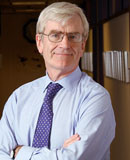 Richard Lambert is currently Director-General of the Confederation of British Industry. From June 2003 until March 2006, he was on the monetary policy committee of the Bank of England. Lambert was a columnist and commentator with a special interest in Europe, the Atlantic Alliance and globalization. He was editor-in-chief of the Financial Times from 1991 until the end of 2001. While remaining editor-in-chief of the newspaper, he relocated to New York in 1997–98 to launch the U.S. edition. Richard Lambert joined the FT after graduating from Oxford University. His other jobs included editor of the Lex investment column, New York bureau chief, financial editor and deputy editor. Since leaving the FT, he has been a columnist and lecturer. He is chairman of Visiting Arts, a non-profit agency which helps to bring international arts and arts managers to the UK and is a Governor of the Royal Shakespeare Company. He is UK chairman of the Franco-British colloque, a high-level group of industrialists and politicians from the two countries, and is a member of the International Advisory Board of British American Business, Inc. He was awarded an honorary Doctor of Letters at the City University, London in 2000, and the following year he received the Prince of Wales’s Ambassador award for his work with business in the community. He has received a number of industry awards, including financial journalist of the year and national newspaper editor of the year, and in 2001 he received the decade of excellence award in the annual World Leadership Forum Business Journalist Awards. Mr. Lambert will examine the way Europe is being presented to the U.S. public through the media, and the way that the U.S. is being covered in parts of the European media. Paper PDF
Richard Lambert is currently Director-General of the Confederation of British Industry. From June 2003 until March 2006, he was on the monetary policy committee of the Bank of England. Lambert was a columnist and commentator with a special interest in Europe, the Atlantic Alliance and globalization. He was editor-in-chief of the Financial Times from 1991 until the end of 2001. While remaining editor-in-chief of the newspaper, he relocated to New York in 1997–98 to launch the U.S. edition. Richard Lambert joined the FT after graduating from Oxford University. His other jobs included editor of the Lex investment column, New York bureau chief, financial editor and deputy editor. Since leaving the FT, he has been a columnist and lecturer. He is chairman of Visiting Arts, a non-profit agency which helps to bring international arts and arts managers to the UK and is a Governor of the Royal Shakespeare Company. He is UK chairman of the Franco-British colloque, a high-level group of industrialists and politicians from the two countries, and is a member of the International Advisory Board of British American Business, Inc. He was awarded an honorary Doctor of Letters at the City University, London in 2000, and the following year he received the Prince of Wales’s Ambassador award for his work with business in the community. He has received a number of industry awards, including financial journalist of the year and national newspaper editor of the year, and in 2001 he received the decade of excellence award in the annual World Leadership Forum Business Journalist Awards. Mr. Lambert will examine the way Europe is being presented to the U.S. public through the media, and the way that the U.S. is being covered in parts of the European media. Paper PDF
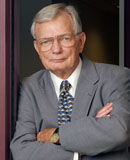 Jack Nelson, former Washington bureau chief of the Los Angeles Times, has been a journalist for more than 50 years. He served in the Times‘s Washington bureau from 1970 through 2001, including 22 years as Washington bureau chief and four years as chief Washington correspondent. He covered the six presidents and every presidential campaign from 1968 through 1996. Since retiring in December 2001, he has continued as a visiting professor of the University of Southern California’s School of Journalism. He began his career at age 18 as a reporter with the Biloxi Daily Herald. Later he served 12 years as a reporter with The Atlanta Constitution where his investigative reporting exposing state and local corruption resulted in numerous investigations and indictments, as well as several state and national journalism awards. He won a 1960 Pulitzer Prize for exposing conditions at Milledgeville State Hospital, then the world’s largest mental institution. While a Constitution reporter, Nelson attended Georgia State College for several years, then studied at Harvard University as a Nieman Fellow in 1961–62. At Harvard, he co-wrote Censors and the School with Gene Roberts Jr., a Nieman classmate. From 1965 to 1970, as the Los Angeles Times’s Atlanta bureau chief, he covered the civil rights movement, which led to two books. He wrote Terror in the Night — The Klan’s Campaign Against the Jews and co-authored The Orangeburg Massacre with Jack Bass. Nelson also co-authored The FBI and the Berrigans — The Making of a Conspiracy with Ronald J. Ostrow, a Times colleague. Nelson wrote Captive Voices — High School Journalism in America, and was one of several co-authors of Beyond Reagan — The Politics of Upheaval. He is the recipient of the Drew Pearson Award for Investigative Reporting, the Robert F. Kennedy Award for Lifetime Achievement in Journalism and was named a fellow by the National Society of Journalists. Mr. Nelson will be writing about the increasing secrecy in the U.S. government. Paper PDF
Jack Nelson, former Washington bureau chief of the Los Angeles Times, has been a journalist for more than 50 years. He served in the Times‘s Washington bureau from 1970 through 2001, including 22 years as Washington bureau chief and four years as chief Washington correspondent. He covered the six presidents and every presidential campaign from 1968 through 1996. Since retiring in December 2001, he has continued as a visiting professor of the University of Southern California’s School of Journalism. He began his career at age 18 as a reporter with the Biloxi Daily Herald. Later he served 12 years as a reporter with The Atlanta Constitution where his investigative reporting exposing state and local corruption resulted in numerous investigations and indictments, as well as several state and national journalism awards. He won a 1960 Pulitzer Prize for exposing conditions at Milledgeville State Hospital, then the world’s largest mental institution. While a Constitution reporter, Nelson attended Georgia State College for several years, then studied at Harvard University as a Nieman Fellow in 1961–62. At Harvard, he co-wrote Censors and the School with Gene Roberts Jr., a Nieman classmate. From 1965 to 1970, as the Los Angeles Times’s Atlanta bureau chief, he covered the civil rights movement, which led to two books. He wrote Terror in the Night — The Klan’s Campaign Against the Jews and co-authored The Orangeburg Massacre with Jack Bass. Nelson also co-authored The FBI and the Berrigans — The Making of a Conspiracy with Ronald J. Ostrow, a Times colleague. Nelson wrote Captive Voices — High School Journalism in America, and was one of several co-authors of Beyond Reagan — The Politics of Upheaval. He is the recipient of the Drew Pearson Award for Investigative Reporting, the Robert F. Kennedy Award for Lifetime Achievement in Journalism and was named a fellow by the National Society of Journalists. Mr. Nelson will be writing about the increasing secrecy in the U.S. government. Paper PDF
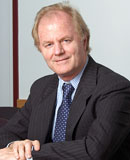 Jonathan Schell, The Nation‘s peace and disarmament correspondent, is also the Harold Willens Peace Fellow at the Nation Institute. Formerly a writer and editor with The New Yorker, he has written extensively on the nuclear question. He graduated from Harvard University in 1965. From 1967 until 1987, he was the principal writer of The New Yorker‘s Notes & Comments section. Schell is the author of several books including The Village of Ben Suc; The Military Half; The Time of Illusion; The Fate of the Earth (nominated for a Pulitzer Prize, the National Book Award and the National Critics Award); The Abolition; History in Sherman Park; The Real War; and Observing the Nixon Years. From 1990 until 1996, Schell wrote a column for Newsday and New York Newsday. His most recent book Writing in Time is a selection of these columns. Schell’s writings have also appeared in Harper’s, The Atlantic Monthly and The Washington Post. He has won several awards, including the George Polk Award, the L.A. Times Book Award, the Society of Professional Journalists Sigma Delta Chi Award and the Melcher Book Award. In 1989, he was awarded a Guggenheim Fellowship and, in 1990, the MacArthur Foundation Grant for Writing on Peace and Security. Schell has taught at Princeton University, New York University’s School of Journalism, Emory University, Wesleyan University and The New School for Social Research. He will design, create a syllabus and produce some lectures for a course that reflects on the solutions the citizens of the United States have come up with to fill a large gap left in our Constitution: how, in addition to voting once every few years, they are to conduct the actual politics of the United States.
Jonathan Schell, The Nation‘s peace and disarmament correspondent, is also the Harold Willens Peace Fellow at the Nation Institute. Formerly a writer and editor with The New Yorker, he has written extensively on the nuclear question. He graduated from Harvard University in 1965. From 1967 until 1987, he was the principal writer of The New Yorker‘s Notes & Comments section. Schell is the author of several books including The Village of Ben Suc; The Military Half; The Time of Illusion; The Fate of the Earth (nominated for a Pulitzer Prize, the National Book Award and the National Critics Award); The Abolition; History in Sherman Park; The Real War; and Observing the Nixon Years. From 1990 until 1996, Schell wrote a column for Newsday and New York Newsday. His most recent book Writing in Time is a selection of these columns. Schell’s writings have also appeared in Harper’s, The Atlantic Monthly and The Washington Post. He has won several awards, including the George Polk Award, the L.A. Times Book Award, the Society of Professional Journalists Sigma Delta Chi Award and the Melcher Book Award. In 1989, he was awarded a Guggenheim Fellowship and, in 1990, the MacArthur Foundation Grant for Writing on Peace and Security. Schell has taught at Princeton University, New York University’s School of Journalism, Emory University, Wesleyan University and The New School for Social Research. He will design, create a syllabus and produce some lectures for a course that reflects on the solutions the citizens of the United States have come up with to fill a large gap left in our Constitution: how, in addition to voting once every few years, they are to conduct the actual politics of the United States.
Fall 2002 Visiting Faculty
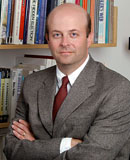 James T. Hamilton, visiting associate professor in the Kalb Chair on Global Communications, is the Charles S. Sydnor Professor of Public Policy and Director of the DeWitt Wallace Center for Media and Democracy at Duke University. His work focuses on the impact of information provision in media markets and in environmental policy. His book Channeling Violence: The Economic Market for Violent Television Programming won the 1999 Goldsmith Book Prize for the year’s best book on media and public policy. He is currently working on a book entitled News Goods: How the Market Transforms Information into News, which addresses the economics of public affairs coverage. He has published environmental policy articles on Superfund, the Toxics Release Inventory and environmental justice. His article “Testing for Environmental Racism: Prejudice, Profits, Political Power?” in the Journal of Policy Analysis and Management won the journal’s best article of the year award. In 2001 he won the Association for Public Policy Analysis and Management’s David N. Kershaw award. He earned his A.B. and Ph.D. in economics in 1991 from Harvard. Professor Hamilton will teach a course entitled “Media Economics.” Paper PDF
James T. Hamilton, visiting associate professor in the Kalb Chair on Global Communications, is the Charles S. Sydnor Professor of Public Policy and Director of the DeWitt Wallace Center for Media and Democracy at Duke University. His work focuses on the impact of information provision in media markets and in environmental policy. His book Channeling Violence: The Economic Market for Violent Television Programming won the 1999 Goldsmith Book Prize for the year’s best book on media and public policy. He is currently working on a book entitled News Goods: How the Market Transforms Information into News, which addresses the economics of public affairs coverage. He has published environmental policy articles on Superfund, the Toxics Release Inventory and environmental justice. His article “Testing for Environmental Racism: Prejudice, Profits, Political Power?” in the Journal of Policy Analysis and Management won the journal’s best article of the year award. In 2001 he won the Association for Public Policy Analysis and Management’s David N. Kershaw award. He earned his A.B. and Ph.D. in economics in 1991 from Harvard. Professor Hamilton will teach a course entitled “Media Economics.” Paper PDF

